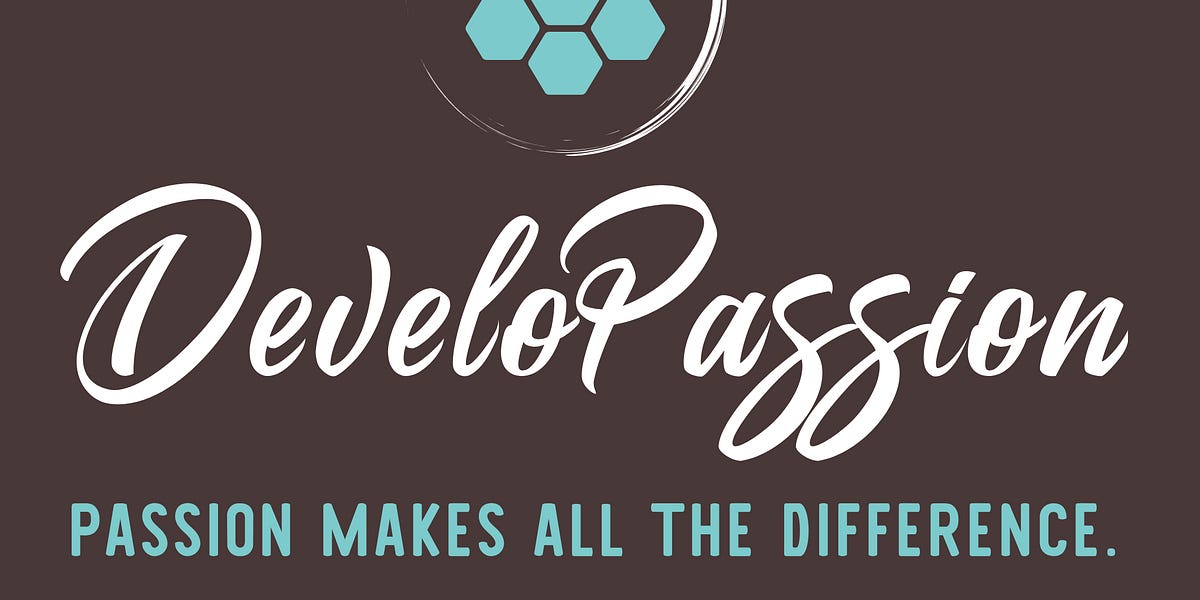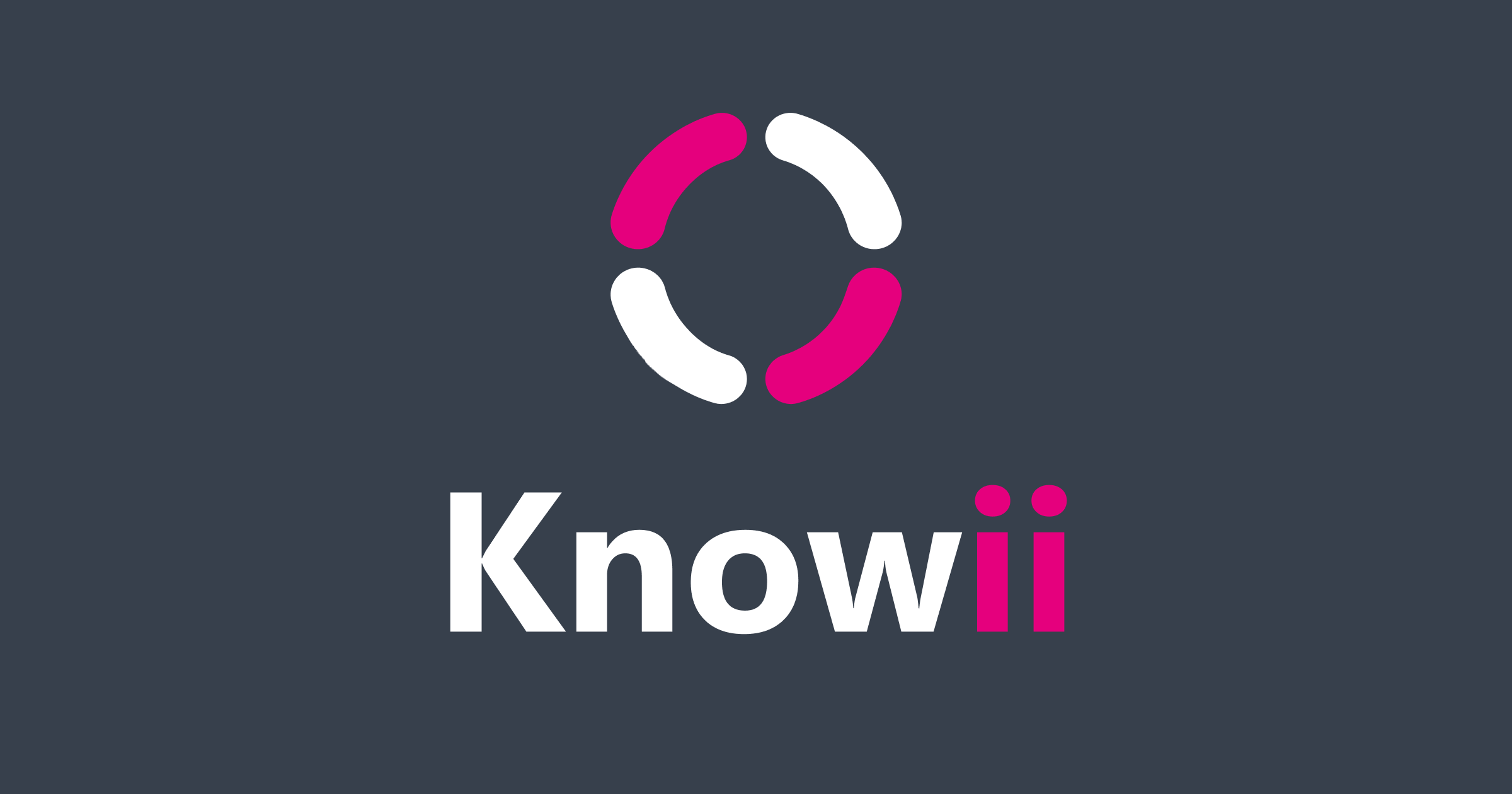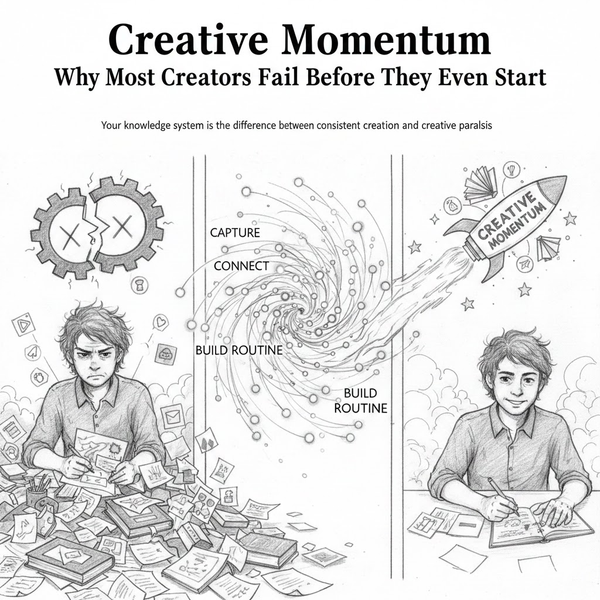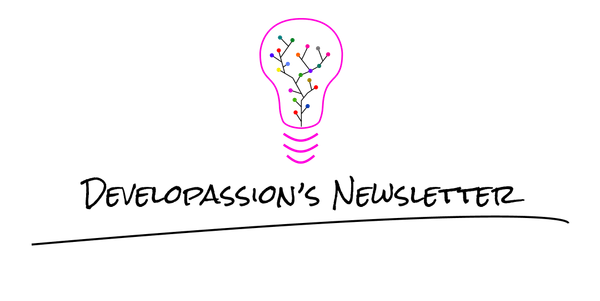The Hidden Cost of Ignoring Knowledge Management - What You're Missing Out On
Knowledge Management isn't just more work—it's a practice that can 10-100x your focus, output, and understanding. Discover what you're missing.

Knowledge Management isn't just more work—it's a practice that can 10-100x your focus, output, and understanding. Discover what you're missing.
In this article, I want to discuss what happens when you don't know about or ignore Knowledge Management. I want to convince you that poor Knowledge Management leads to tons of missed opportunities and unnecessary struggles in your professional life.
Introduction
"I don't have time for that."
"Sounds like more work to me."
"My system works fine already."
These are the common responses I hear when discussing Knowledge Management with knowledge workers and leaders. Many dismiss it as just another productivity trend or an extra burden on their already busy schedule.
But in fact, Knowledge Management isn't about adding more work to your day — it's about transforming how you handle the work you already do.
How much time do you spend looking for information you know you've seen before? How often do you solve the same problems repeatedly? How frequently do you feel overwhelmed by the sheer volume of information floating around?
These aren't just minor annoyances. They're symptoms of a deeper issue that's costing you and your organization dearly.
Let me listen to this 🎙️
I have used AI to generate a podcast version of this article. You can find it here:

What You're Really Missing
When people ignore or dismiss Knowledge Management, they're not just missing out on a better way to take notes. They're missing out on what I call a "knowledge multiplier effect", the ability to exponentially increase the value of everything they learn, think, and create.
Mental Clarity When You Need It Most
First and foremost, Knowledge Management provides something we all desperately need: mental clarity.
Without a system for managing knowledge, your brain is constantly juggling countless pieces of information. Every email, meeting, article, and conversation adds to the cognitive load. The wheels keep spinning faster and faster.
This isn't just about productivity per se. It's about regaining control over your mental space, reducing anxiety, and creating room for deeper thinking. Knowledge Management allows you to externalize your thinking, freeing your mind from the burden of remembering everything.
10-100x Your Professional Output
The thing is, proper Knowledge Management can multiply your professional effectiveness in ways you might not even realize.
Knowledge Management enables...
- Finding information in an instant — No more digging through folders, emails, or browser history trying to locate that crucial piece of information
- Accumulating knowledge and retaining information forever — New information connects to existing knowledge, creating deeper understanding instead of isolated facts
- Problem-solving becomes more effective — Solutions emerge from connecting dots across different domains and past experiences
- Decision-making becomes more confident — With complete information at your fingertips, you can make choices based on the full picture, not just what you happen to remember
- Innovation becomes natural — New ideas often emerge at the intersection of existing concepts — something only possible when your knowledge is interconnected
This isn't about working harder. It's about systematically leveraging everything you already know and learn.
Getting Things Done++
To me, Knowledge Management is like an extension of Getting Things Done (GTD). But while GTD focuses on organizing actions and next steps, Knowledge Management also focuses on organizing and connecting information and ideas.
Together, they form a complete system for managing both your workflow and your thinking. GTD handles the "what needs to be done" while Knowledge Management handles the "what do I know" and "how do these things connect."
This combination is particularly powerful for leaders and knowledge workers whose value comes from making connections between ideas and translating knowledge into action.
The Common Objections (And Why They Don't Hold Up)
I've heard all the objections, and I get it. Let me address the most common ones:
"I don't have time for this"
The reality is you don't have time NOT to do this. The hours spent searching for information, recreating lost work, or solving the same problems repeatedly far outweigh the investment in setting up and maintaining a Knowledge Management system.
Plus, you can start small. Even 15 minutes a day devoted to capturing and connecting key ideas will yield significant returns within weeks.
"My memory works fine"
Our brains are amazing, but they're not designed to store and retrieve vast amounts of detailed information. Psychological research shows that we forget approximately 50% of new information within an hour and 70% within 24 hours.
Knowledge Management isn't about replacing your memory — it's about augmenting it, allowing your brain to focus on what it does best: making connections and generating insights.
"It's too complicated"
It doesn't have to be. While there are sophisticated approaches to Knowledge Management, you can start with something as simple as a folder with text files or a basic note-taking app.
The key is to begin capturing information and making connections between ideas, not to build a perfect system from day one.
And it's fundamentally NOT about tools, but about practices and habits.
What True Knowledge Management Looks Like
Knowledge Management goes far beyond just note-taking apps and techniques. It's a comprehensive approach to managing your professional and personal life.
At its core, Knowledge Management is about:
- Capturing information effectively as it comes to you
- Organizing it in a way that makes sense for future retrieval
- Connecting ideas to create new insights (going from first principles)
- Sharing knowledge efficiently with others
- Retrieving information easily when needed
When implemented well, it becomes the foundation for everything you do. It's like having a second brain that remembers everything perfectly, makes connections you might miss, and offers insights just when you need them.
How This Transforms Real Work
Let me make this concrete with a few examples of how Knowledge Management transforms everyday work:
- For meetings: Instead of scattered notes across different notebooks or files, you have a connected system that links meeting notes to projects, decisions, and relevant reference materials. When someone asks, "What did we decide about X last month?", you have the answer in seconds, not hours.
- For decision-making: When faced with complex choices, you can quickly retrieve all relevant information, past experiences, and considerations, leading to better decisions made with confidence.
- For leading teams: Knowledge Management enables you to share context, decisions, and information efficiently, reducing misunderstandings and creating shared understanding across your team.
- For research: As you explore new topics, each piece of information connects to your existing knowledge, creating a rich web of understanding instead of isolated facts. What would take others weeks to learn, you can absorb and integrate in days.
- For creative work: Ideas don't emerge from nothing. They come from connecting existing concepts in new ways. With a Knowledge Management system, these connections happen more frequently and naturally, sparking innovation and creative breakthroughs.
The world's most effective knowledge workers and leaders aren't necessarily smarter than everyone else. They just have systems for capturing, organizing, and retrieving knowledge that multiply their natural abilities.
Where to Start (Without Overwhelming Yourself)
Hopefully, I've convinced you that Knowledge Management matters. Now, you might be wondering where to start.
First and foremost, understand that this is not about perfect systems. It's about starting simple and evolving over time.
Here's a simple way to begin:
- Choose a central place for your knowledge: This could be as simple as a folder with text files, a basic note-taking app, or something more sophisticated like Obsidian. The key is having a single source of truth.
- Develop a capture habit: Start capturing key ideas, insights, and information as you encounter them. Don't worry about organization yet — just get them into your system.
- Build connections gradually: As your collection grows, begin looking for natural connections between ideas. This is where the magic happens.
- Review regularly: Set aside time weekly to revisit recent additions to your knowledge base, strengthening connections and identifying insights.
I've found journaling to be the perfect entry point for people interested in better managing their knowledge. A digital journal helps focus on what matters, capture new information that you come across, capture your ideas and thoughts, etc. Importantly, it also enables looking back more objectively (i.e., what did I do last week?)
For a more comprehensive guide to getting started with Knowledge Management, I've created an entire course that helps you go from zero to one: https://knowledge-management-for-beginners.com

If you're ready to transform how you manage information and knowledge, then that course is for you. It provides a structured approach to building a system that works for your specific needs.
Going Further
Knowledge Management is a skill that can be developed like any other. And like any valuable skill, investing in proper training can accelerate your results dramatically. For those who prefer personalized guidance, note that I offer one-on-one Knowledge Management coaching for both newcomers and more advanced knowledge workers.
Also, being part of a supportive community with structured resources can accelerate your progress dramatically. That's one of the reasons why I have created Knowii, a complete knowledge transformation system designed specifically for knowledge workers and leaders like you.
Knowii isn't just another course or tool. It's a comprehensive community that unifies all my resources:
- Access to all my courses and tools in one integrated ecosystem
- Structured learning paths that take you from beginner to advanced in Knowledge Management
- Implementation resources that help you apply what you learn immediately
- Accountability systems to ensure you make consistent progress
- Direct support from both peers and experts facing similar challenges
As a Knowii member, you'll join a community of like-minded professionals committed to transforming scattered knowledge into personal power through systematic thinking and efficient workflows. Knowii is the central hub of my knowledge ecosystem, where all my work comes together to deliver maximum value. It's where I help people just like you break free from information overload and build systems that actually work.
Learn more and join the community at https://www.dsebastien.net/join-the-knowii-community-and-fix-your-information-overload-problem/

Conclusion
I don't like creating "FOMO", but if you're ignoring Knowledge Management, then you ARE clearly missing out. Especially now that AI is becoming so powerful. Knowledge Management isn't just another productivity system or technique. It's a fundamental change in how you handle information and ideas, a shift that can multiply your effectiveness, reduce stress, and unlock capabilities you didn't know you had. Nowadays, the ability to efficiently capture, organize, connect, and retrieve knowledge isn't just a nice-to-have. It's a crucial skill. Everyone is going to use AI, that won't be a differentiator for long. But those who combine AI and Knowledge Management will have the edge.
Armed with a knowledge system, you'll be in a much better position to remain relevant now and in the future.
That's it for today! ✨
About Sébastien
I'm Sébastien Dubois, and I'm on a mission to help knowledge workers escape information overload. After 20+ years in IT and seeing too many brilliant minds drowning in digital chaos, I've decided to help people build systems that actually work. Through the Knowii Community, my courses, products & services and my Website, I share practical and battle-tested systems. You can follow me on X 🐦 and on BlueSky 🦋.
I am an author, founder, and coach. I write books and articles about Knowledge Work, Personal Knowledge Management, Note-taking, Lifelong Learning, Personal Organization, and Zen Productivity. I also craft lovely digital products.
If you want to follow my work, then become a member and join our community.
Ready to get to the next level?
If you're tired of information overwhelm and ready to build a reliable knowledge system:
- 🎯 Join Knowii and get access to my complete knowledge transformation system
- 📚 Take the Course and Master Knowledge Management
- 🚀 Start with a Rock-solid System: the Obsidian Starter Kit
- 🦉 Get Personal Coaching: Work with me 1-on-1
- 🛒 Check out my other products and services. These will give you a rock-solid starting point for your note-taking and Knowledge Management efforts







